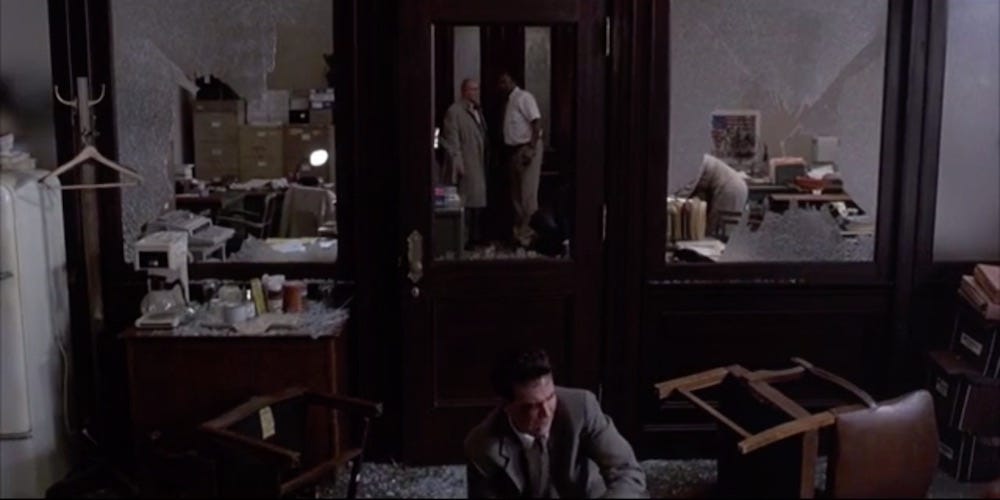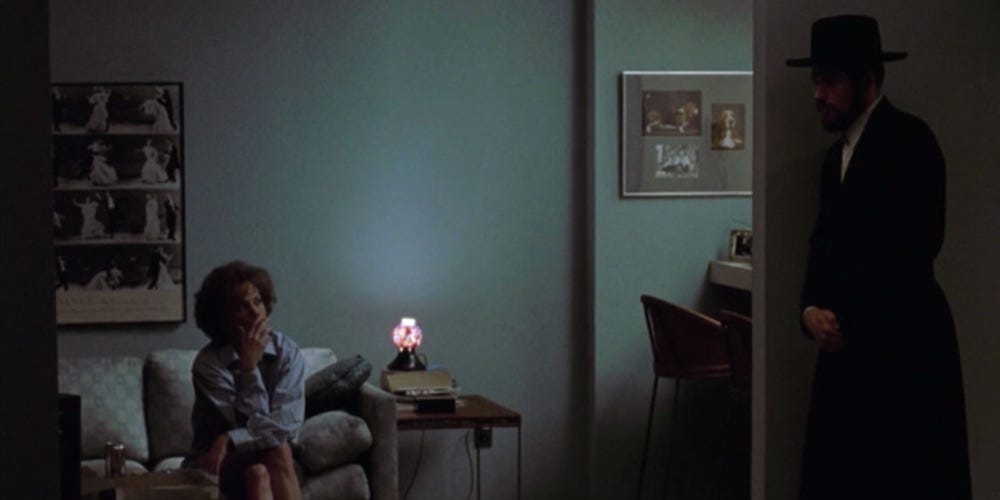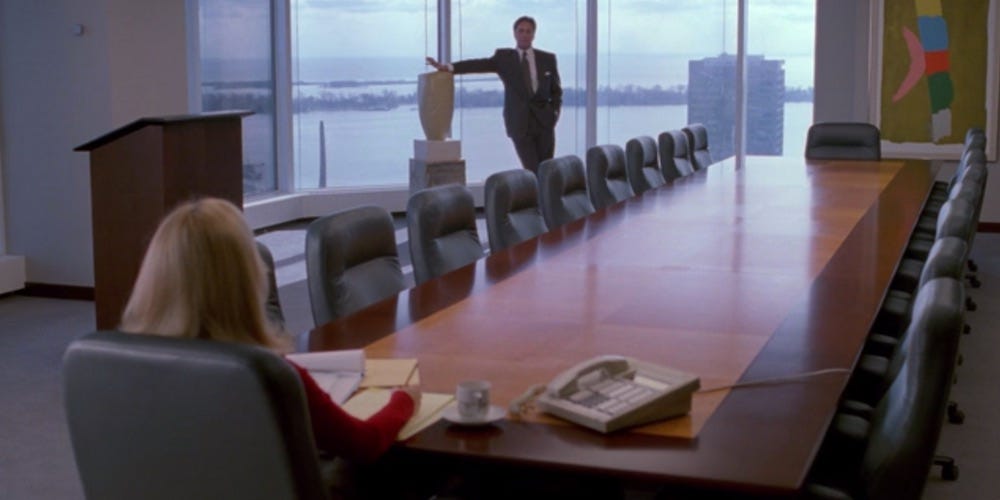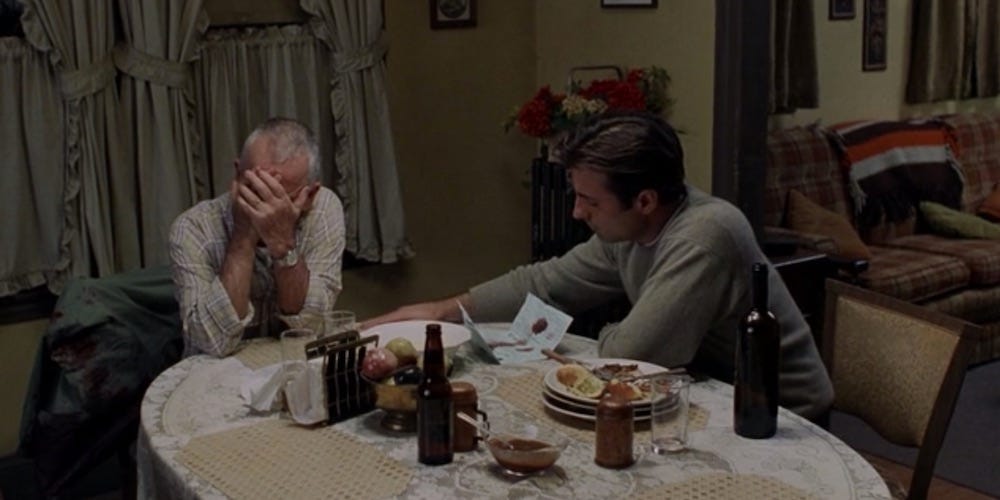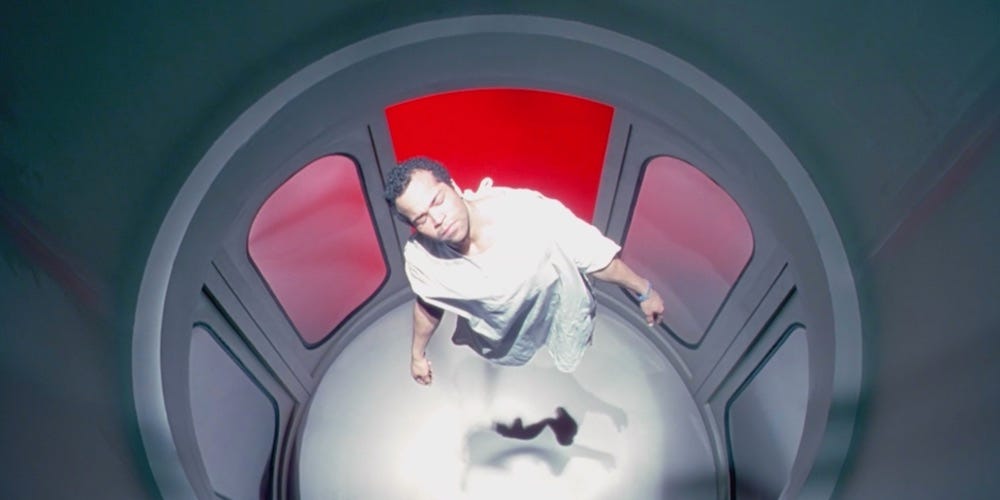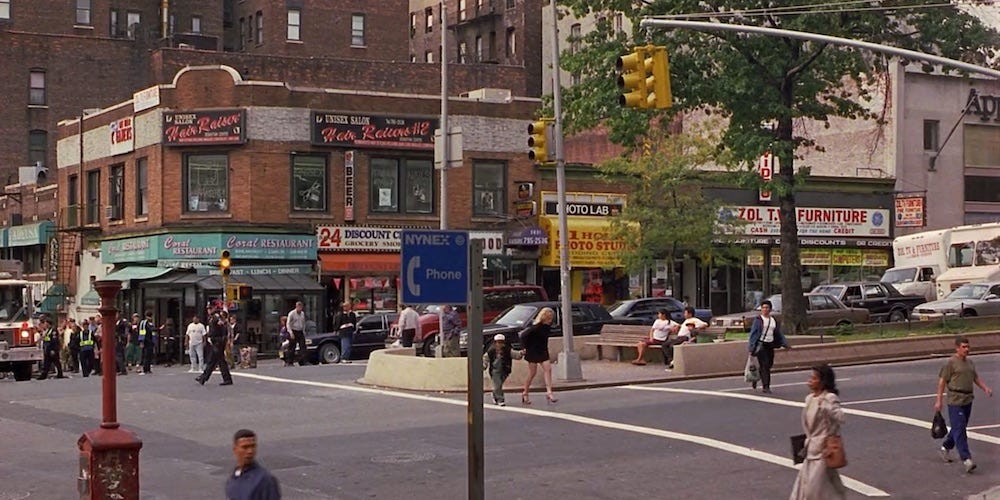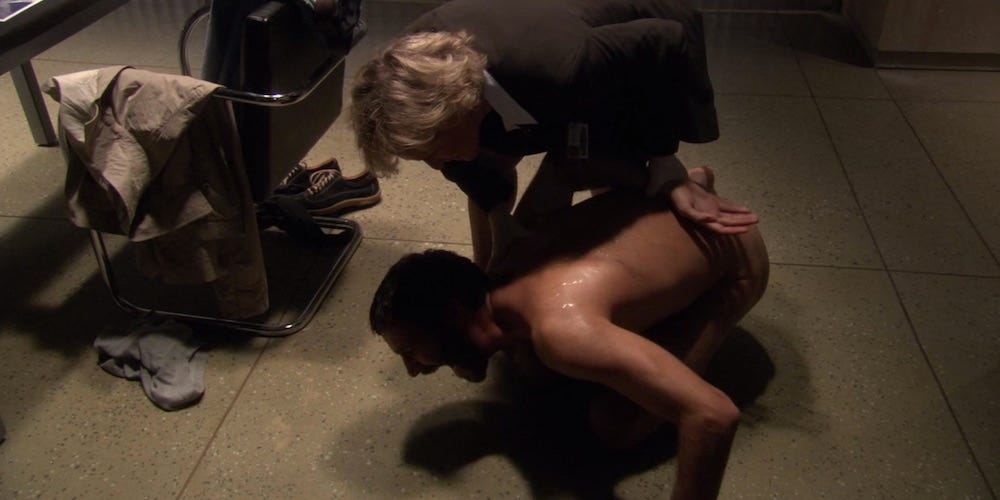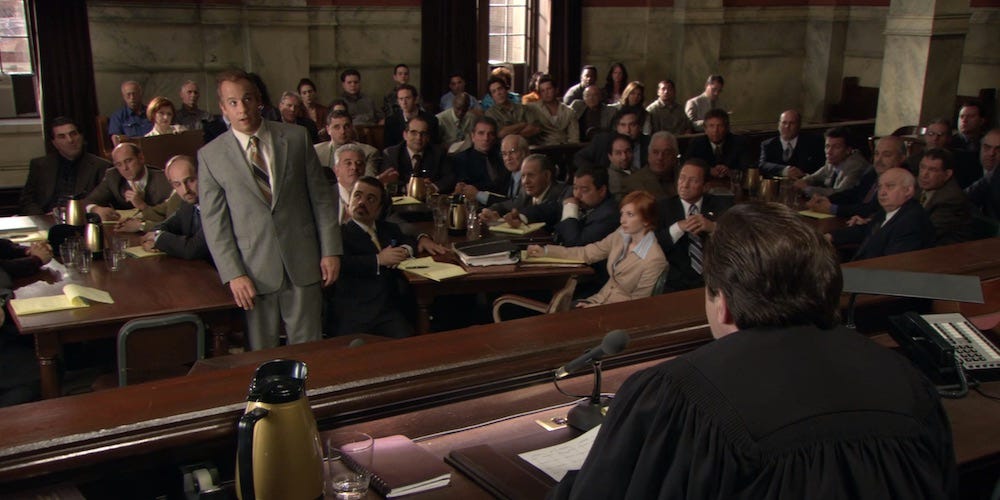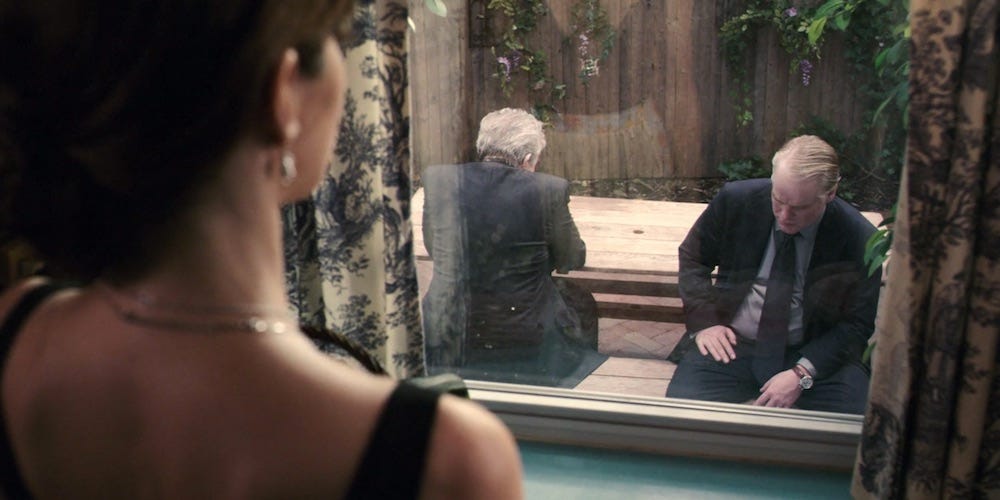syllabus: sidney lumet (pt. 5 – 1990-2007)
death (“law & order”-core) and resurrection (“HBO legal dramedy”-core)
lumet’s final two decades of output can weirdly be boiled down to two contrasting creative statements that directly dovetail with two major developments in TV: sanctioning the tedious empire of basic-cable courtroom dramas steadily revolving around law & order and inviting the experimentation of HBO’s aughts dramedy renaissance. the first half of the ’90s saw him noticeably lowering his guard when it came to de-hollywoodifying his scripts, with car chase scenes, psychopathy born of childhood trauma, and other tropes weighing down a few variations on his familiar legal-drama formulas.
interestingly, several of these films also happened to feature actors who went on to be regulars on the sopranos and the wire, with some of the more inventive ideas such as blurring reality and dream and legal drama and comedy seemingly laying the groundwork for those series. i can’t imagine it’s any coincidence that lumet worked with HBO near the end of his life, creating a structurally experimental post-9/11 satire for the network alongside oz creator tom fontana. actually i’ve never seen that series, does it have any connection to the wiz?
law & order ass (1990-1996)
Q & A (written by sidney lumet, adapted from edwin torres’ novel; 1990)
after two decades of one-good-apple cop movies rooted in non-fiction, lumet deserved to lean into a more cinematically fictional account that provides a denser set of themes than prince of the city while aesthetically aligning with what abel ferrara and michael mann were doing around this time (not to mention brian de palma—the author of the book this film is based on also wrote carlito’s way). another movie about a member of the justice system learning to question what constitutes a “good” cop only to find himself caught in that classroom situation where you’re assigned to debate a topic on the side you don’t believe in, all while reckoning with the evil legacy his father helped build. yet another depiction of lumet’s generation reaching over boomers to align their ethical sensibilities with the generation lumet’s interracial daughter falls into, who appears here as the figure around which much of the film’s racial dialogue revolves. co-starring junior soprano as junior soprano and big pussy, for some reason, prominently featured chatting in the background of a bar scene.
a stranger among us (written by robert j. avrech; 1992)
the structure of this movie reminds me of kindergarten cop in the way its opening scene of violence ultimately sets in motion a culture-clash comedy complemented by an unlikely romance and not-particularly-interesting thriller C-plot. in this case neither the comedy nor (spoiler, if you’re not aware of lumet’s morals) the romance really comes to fruition, though nearly every other element of this movie sees lumet disappointingly lean into the hollywood playbook (there’s even a brief yet very expensive car chase scene) rather than sticking to his guns: the premise feels carelessly copied-and-pasted from witness, the critique of the NYPD feels limited to one bigoted co-worker, the cop’s immersion into the hasidic community feels like tyra in a fat suit, the ongoing conversation between laws and commandments doesn’t really lead to any interesting ideas—ultimately it all just feels transparently like the anti-antisemitism PSA it was first developed as. co-starring jim gandolfini as tony soprano.
guilty as sin (written by larry cohen; 1993)
movie about exposing cracks in the legal system that’s unique for lumet in that it isn’t about corrupt groups so much as it is about an exclusively cinematic portrayal of individual psychopathy. feels right in line with his ’90s output when it reveals itself to be another woman-led legal drama about sexism (the double standards among professional couples exposed by what could be considered a male femme fatale) and biases (specifically how “sleaze” doesn’t necessarily correlate to “criminal”) before things go a little off the rails, veering into the realm of what lumet himself called “rubber ducky” drama (i.e. introducing childhood trauma as source of delinquent behavior). pretty fun as a popcorn movie, though, with don johnson doing hannibal lecter, patrick bates, and jack nicholson’s joker all at the same time. the sandwich scene does feel like the moment he truly confirms his psychopathy, only it’s less due to the way he brandishes his comically large knife than it is the amount of mayo he’s slathering on that thing.
night falls on manhattan (written by sidney lumet, adapted from robert daley’s novel tainted evidence; 1996)
lumet-by-numbers hybrid of the verdict and prince of the city that contains no shortage of familiar themes from the director’s filmography: one-good-apple-ism, concerns of innocence among a father/son law enforcement duo, bizarre casting choices for the roles of those fathers and sons. appreciate that this feels much more like the wire’s complex legal ecosystem than the thrillers and law and order-esque aesthetics lumet was honing in the early ’90s, not to mention the fact that after watching 40 of this man’s movies, this archetypal wide-eyed lumet idealist figure is able to side-step nearly every trap his predecessors tended to fall victim to at the hands of careerist predators as he slowly begins to learn that he’s being tasked with defending an overtly corrupt legal system rather than just one faction of it, which he happens to be related to. it even works as a broader coming-of-age story applicable to plenty of other careers where all you can do is strike a reasonable balance between your own code of ethics and the shitty favors-based economy everyone else quietly operates under. anyway, ian holm doing a brooklyn accent is a hell of a thing to experience.
OK grandpa, let’s get you to bed (1997-2007)
critical care (written by steven schwartz, adapted from richard dooling’s novel of the same name; 1997)
possibly exactly what you’d expect from a septuagenarian auteur clinging to autonomy by promising a movie that drafts off the newfound popularity of TV medical dramas and film’s legal thrillers while also reinstating the capitalist satire of his most famous film with a dash of his biggest blockbuster’s fantasy. maybe chayefsky’s the hospital is the best point of comparison in this pre-scrubs, pre-schiavo sweeping structural satire of the american healthcare industry, though on a technical level this resembles 12 angry men in its stiflingly claustrophobic interiors that persist until the final scene, while thematically it’s your typical lumet narrative as a yuppie do-gooder comes of age within his profession by getting caught in the gears of its money-grubbing machine—in this case learning that the terminal patients he cares for are little more than pawns used by third parties to make or avoid losing great sums of money. interesting use of colors here, as everything and everyone is nearly pallid outside of the hallucinogenic angel/devil sequences aside from the IRL figures of evil wearing bright red—not to mention spader who, in being morally confused, and in it being the ’90s, rocks a terminally sick red, black, and white bulls jacket.
gloria (written by steve antin, remade from john cassavettes’ script for his 1980 film of the same name; 1999)
movie about how hard it is to change friend groups. very “sidney lumet” of sidney lumet’s most just-collecting-checks movie to be a remake of cassavetes (made within a strange Y2K era of such classics being questionably rebooted with the most poorly-aged fashion/facial hair choices you could imagine) that swaps cab hailing for car chases. seems like it takes so many creative liberties with the plot along the way that in putting the story back together again it loses its entire sense of intrigue, while its star is so dedicated to inhabiting gena rowlands that she never comes close to figuring out who her character is. lumet could probably be absolved given that he signed on to this film mid-production and clearly had no idea how to direct a child, though i can certainly forgive george c. scott for that irish accent given that he barely lived long enough to see the movie bomb in theaters. odd that the most mob-centric of lumet’s ’90s movies was the first to be devoid of any sopranos in its cast.
strip search (written by tom fontana; 2004)
despite the explicitly post-9/11 setting and structural gimmick, everything about this hour-long HBO special is pure lumet, from its intro referencing HUAC to the theatrical feel and dual storylines giving us a glimpse of both sets of actors’ approaches to their characters, to the claustrophobic single-room set with a malfunctioning fan. feels aggressive in the same way those “stand up to hate” PSAs do and nearly as cringey, even if the MO here is considerably less vague as it illustrates the bush era’s legacy of ritual humiliation (this was released immediately before abu ghraib, but pulled from the air after one screening—honestly surprised it resurfaced on max recently) and dismantling our own domestic freedoms we love nothing more than to brag about.
find me guilty (written by sidney lumet, t.j. mancini, and robert j. mccrea, based on court transcripts; 2006)
yet another courtroom film that might feel like a senile postscript to lumet’s 40+ film career when its action-movie star (vin diesel, also playing outside typecasting by, uh, soliloquizing for two hours about family) does a wet fart within the first 8 minutes, but in a sense it’s also the perfect summary of an idea that lumet was long obsessed with: reckoning with his fictionalization of real-life headline-news stories that were even more ludicrous than his depictions of them by opening his movie with a title card announcing that the courtroom dialog was almost entirely pulled from transcripts of the actual high-profile case, solidifying his argument that the more fact-based professions he documents in his movies—courts of law and those who enforce the legal code—rely just as much on high drama in their line of duty. after giving so many of the sopranos cast members their start it’s cool to see that lumet was able to make something like this clearly due to that show’s success in tapping the same vein of comedy the italian-american civil rights union was so adamant francis coppola not approach some thirty years prior.
before the devil knows you’re dead (written by kelly masterson; 2007)
perfect coda for a knowingly imperfect filmmaker whose mission was to learn something new with every script he accepts, as it has all the lumet hallmarks: career-defining dramatic roles from its two male leads, a borderline-insulting one for their female co-star, and more than enough ethical turmoil in the tank to fuel its two-hour runtime, to say nothing of specifically revisiting the botched robbery of dog day afternoon, the caged interiors and jump-cut transitions of the pawnbroker, the life-support medical drama of critical care—and, regrettably, the structural gimmickry of strip search. this feels like a film student’s debut rather than the 44th and final movie in a director’s career, with the writer needlessly shuffling the deck merely to subvert linearity, playing his cards whenever he feels rather than when it suits his characters’ inner lives (hawke and PSH do enough with their takes on a big-brother/little-brother dynamic that this movie is deeply memorable despite the “i said no guns” and botched insurance fraud robbery cliches). quite possibly lumet’s most hopeless movie, too—sad that his conclusive statement boils down to the observation that the world is an evil place.


